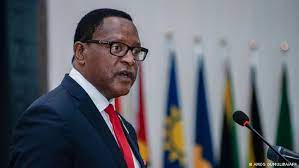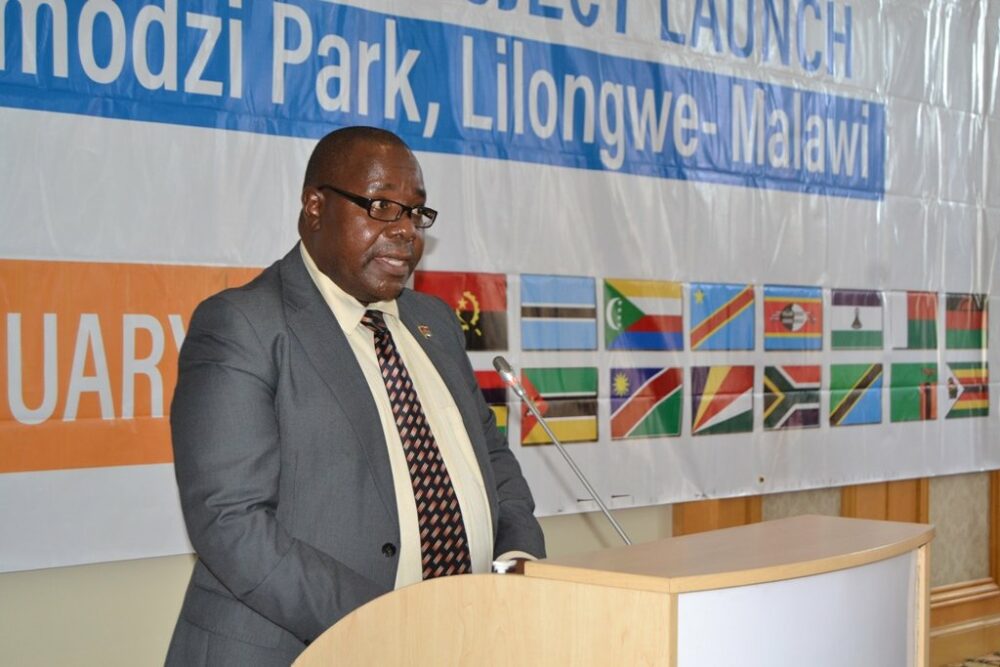By the CIJM
Malawi’s newly appointed Minister of Mining Albert Mbawala has his work cut out in order to uplift the mining sector which his boss President Lazarus Chakwera has earmarked as the replacing of the Tobacco as the major contributor to the country’s Gross Domestic Product (GDP).
In his recent State of Nation Address President Chakwera reiterated his government’s plans of increasing the mining sector’s contribution to the GDP from the current 3 percent to 20 percent as well as empowering economically communities where minerals are being mined.
The President said the mining sector can turn the economic fortunes of the country as it can promote economic development, reduce unemployment, reduce poverty, boost foreign exchange reserves and reduce dependence on donors.
“Malawi is a mineral rich country. What we have lacked for decades is the patriotism, leadership, discipline and collaboration to blend the natural resources with our human resources to create developmental riches. But the era of economic mismanagement is over.
“ With your help and trust, we will turn our God-given resources into roads, bridges, universities, hospitals, parks and apartment blocks over the next two decades. We will turn our mineral capital into development capital,” said Chakwera
But the country’s plans to boost the mining sector currently meets many obstacles, one of which is the influx of foreign small scale miners especially Chinese nationals that are most of the times reportedly exploiting rural communities.

Reports have shown that over the years, 250 small scale licenses have been issued by the Malawi government with the expectation of improving livelihoods of but most of the miners resort to smuggling of the minerals.
Several reports have shown that foreigners are carrying out mining activities in rural areas in districts such as Ntcheu, Mzimba and Chitipa.
This development has led to squabbles between communities and mining companies at times leading to closure of some mines.
For instance, in 2019 people from Mbirima in the northern district of Chitipa bordering Malawi and Tanzania stopped a Chinese mining firm from collecting mineral samples forcing them to first make commitment to conduct tangible corporate social responsibility in the area.
Traditional leaders in the area at the time said the Chinese firm had been collecting large volumes of samples for three months which angered the community members.
“They are hiding behind the samples, in actual fact, they are already mining but they do not want to commit themselves for the corporate social responsibility. Our area currently lacks a clinic, school block and good of roads,” said one chief.
In a similar vein, a chief’s council in Mzimba forced Chinese nationals to shut down all mining activities in the district as they were doing their activities without clear mining documents.
The Chiefs’ Council Secretary Senior Chief Mpherembe at the time said their action came as government was failing to communicate to them on the licences given to the Chinese miners.

The chiefs said they were concerned with Chinese nationals flooding the district to mine gemstones and other minerals allegedly without valid documents or entering into joint ventures with local firms.
“We stopped any mining activity in the district until we are told how government gave the Chinese nationals mining licenses. All we want is that if government has allowed them to mine our precious stones, we will demand signed agreements which must involve officials of M’mbelwa District Council and government,” Mpherembe said.
Many residents in the district had been expressing concern that Chinese miners are duping them over minerals being mined in the district.
They claimed that they are losing out on a number of minerals such as rose quartz, rock crystal quartz, smoky quartz and mica.
Different media outlets have been reporting that Chinese nationals have been going to different parts of Mzimba district as buyers of precious stones but, within a few months, they start mining.
Some residents also said the Chinese nationals use Malawians to get licences and leave them in the cold once they get authorization.
Sanitizing The Mining Sector
In a recent press conference on the status of mining sector in Malawi, Minister of Mining Albert Mbawala said government is aware of the problems faced with the sector which include exploitation and alleged corrupt practices as well as smuggling of minerals by foreign nationals.
Mbawala said mining is one of the areas from which the country can diversify its economy and the government is establishing a Mining Regulatory Authority to help boost the mining sector which in line with the MW2063, has been set as a priority that would diversify the economy and change the country’s economic landscape.
“The Mining Regulatory Authority Bill is already with the Minister of Justice before it is brought to Parliament in order for it to be established,” Mbawala said.
He also disclosed that the government is establishing a mining company and the ministry is awaiting for the Ministry of Finance to give funding amounting to about K5 billion for it to be operational.

Mbawala also said support is being given to mining cooperatives who are based in rural communities for them to be registered as one way of eradicating the problem of exploitation.
“That is why we are registering them, so that the sector is easy to regulate and the coming in of the Reserve bank of Malawi as a buyer of minerals like Gold has also added to reduced cases of smuggling minerals for better prices elsewhere,” he said.
A recent baseline survey by Perekezi ASM Consultants also established a number of gaps in policy and legal frameworks that are hindering progress in the mining sector.
One of the partners at the firm, Chikomeni Manda, observes that the absence stringent policy and legal framework is fueling illegal mining, which is coupled with export of raw minerals.
Manda recommends that there is a need to strengthen the oversight functions of the policy makers and other key stakeholders in the mining sector in Malawi
“There is need to build capacity on social accountability in the mining sector across the various players particularly Members of Parliament, CSO, media and communities so that there is increased participation and greater benefits.

The capacity building will enable various players to adequately fulfil their roles for the benefit of the nation and this will in the process enhance the realisation of increased social accountability and fiscal transparency in the mining sector,” he said.
In May 2021 Member of Parliament for Zomba Central Bester Awali also urged the government to suspend all mining activities until the Mining Regulatory Authority was established.
He expressed concern that some mining companies steal minerals by claiming that they are taking out samples for testing.
“All minerals that were taken out of the country as samples but were not brought back after failing tests should be considered sold and appropriate royalties be deposited in Government Accounts.
“We shall lose more money by letting the mining and extractive industry to do business as usual,” Awali said.
Echoing his sentiments was Member of Parliament for Chitipa South Welani Chilenga who is also chairperson for Parliamentary Committee for Natural Resources.
Chilenga called for more action in dealing with illegal mining activities happening across the country.
“Malawi is losing close to MK20 million on daily basis through illegal mining taking place at Namizimu in Mangochi, Malingunde in Lilongwe, Vuwa in Nkhotakota and Perekezi in Mzimba,” said Chilenga.
Malawi has several minerals with economic potential, such as: Phosphates (apatite), Bauxite, Kaolinitic, Coal, Kyanite, Limestones, Rare Earths (including Strontianite and Monazite), Graphite, Sulphides (Pyrite and Pyrrhotite), Titanium minerals along the Lakeshore, and Vermiculite.
The Centre for Investigative Journalism Malawi (CIJM) – www.investigative-malawi.org – and the Africa China Reporting Project – https://wits.journalism.co.za/africa-china-reporting/, supported this article.
ENDS

